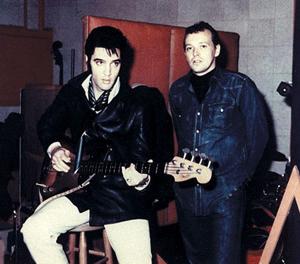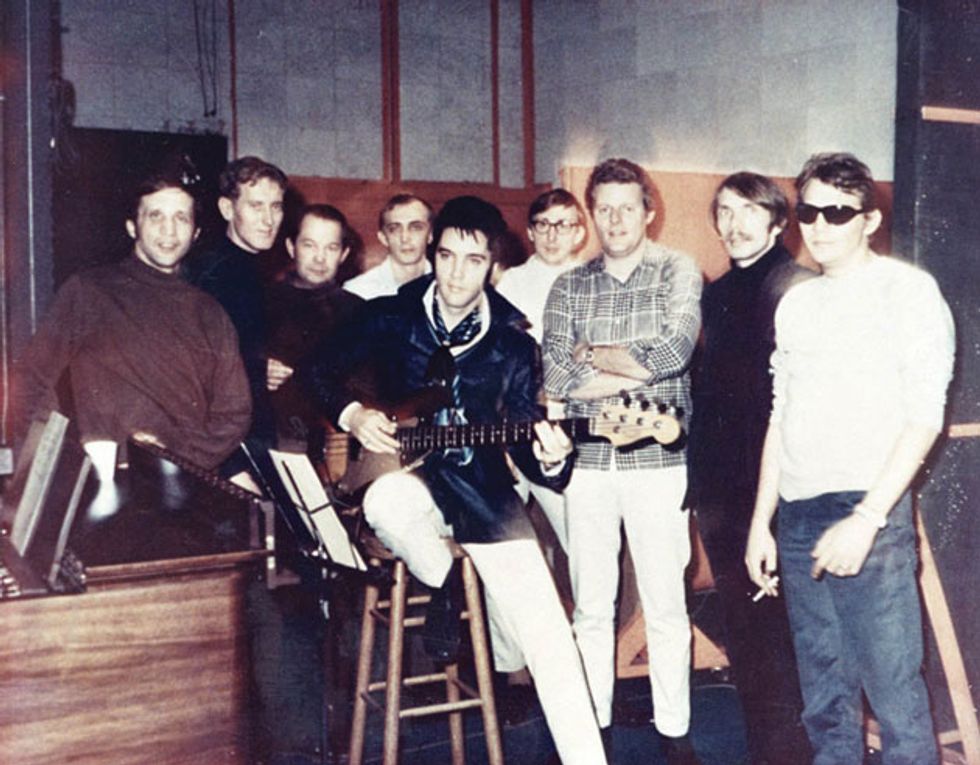
Very saddened to report that Bobby Emmons passed away yesterday (2/23/15) in Nashville, TN. My deepest sympathies go out to his family and to the Memphis Boys.
Link to Rolling Stone story:
http://www.rollingstone.com/music/news/legendary-musician-bobby-emmons-dead-at-72-20150224
Link to Memphis Commercial Appeal story:
http://www.commercialappeal.com/go-memphis/music/news/american-studio-keyboardist-bobby-emmons-dies_50354474
Here is a brief bio from Bobby's web site:
Born February 19, 1943, in Corinth, Mississippi. Son of Elmer and Minnie Emmons.
Self taught musician except for childhood beginner's lessons with private teachers Gainus and McCord. Chosen with four other high school classmates for FFA String Band contest, winning State Championship is 1957 after a three level competition.
Professional musician/songwriter since 1959. Member of Bill Black's Combo 1960-63, trade magazines' "Instrumental Group of the year" all three years. Played hundreds of concerts and shows with Bill in 47 states, Canada, Nassau and Jamaica and appeared in 2 Hollywood motion pictures.
Member of studio staff band in Memphis, Tennessee at Hi Records, then at American Studios (two of the major "hit factories" of the sixties and seventies). One of five nominated for Memphis Music's "Outstanding Musician of 1971." Played piano, organ and electric keyboards on studio master sessions at Fernwood, Hi, Sun, Phillips International, Sounds of Memphis, Stax, Ardent and "The Jungle Room" (Elvis' den) among others.
Nashville session player since 1972 winning NARAS "Superpicker" awards 1972-1979 (honoring musicians who played on #1 records). Declined custom session work starting in 1980 to pursue song writing and project recording full time.
Top songs written include "Help Me Make It To My Rockin' Chair" (B.J. Thomas), "Luckenbach, Texas," "Women Do Know How to Carry On" and "Wurlitzer Prize" (Waylon Jennings, (1978 and Nora Jones 2004)), "Love Me Like You Used Too" (Tanya Tucker) and "So Much Like My Dad" (George Strait). Received 2 nominations for "Song of the Year," nominated for 3 Grammies, received 6 Citations of Achievement and 3 Millionaire Awards from Broadcast Music Inc. for radio airplay, and was honored by Nashville Songwriters Association International for "creative genius in words and music."
Project recordings include Willie Nelson albums "Always on My Mind," "City of New Orleans," "Take It to the Limit," "WWII" (Willie and Waylon), "Pancho and Lefty" (Willie and Merle Haggard) and "Highwayman" albums 1 and 2 (Supergroup of Willie, Waylon, Johnny Cash and Kris Kristofferson). Also played Hammond B3 on all Highwaymen tours world wide.





![B9318588247Z.1_20150825212045_000_GVSBNQDOM.1-0[1] B9318588247Z.1_20150825212045_000_GVSBNQDOM.1-0[1]](https://blogger.googleusercontent.com/img/b/R29vZ2xl/AVvXsEidkCuNvZyAwzsSwWZpCxNRsPPWS97io-JPmgvuPaGvSORi_fzugyZGpyztOT2ZGqRJjiRmZD815Txg66ZSleuKyors4hJTZ41Lwu0Q77wp_ORH0geF-8k4grz-8fF9MlGESFkJ/?imgmax=800)
![635730018850225314-XXX-3615-74628218[1] 635730018850225314-XXX-3615-74628218[1]](https://blogger.googleusercontent.com/img/b/R29vZ2xl/AVvXsEjvesZgS3KqJ_9n8G1o52eG9bpOjrcx8acsyAVCmUr1QEeo5Z9crPDkYnYPyrPkunlZ-ANf_UYiYtkfn2sRvPLnGwRx-JXeLxHGZECyq3QULLUz4-GQCG_XbHBXzhkJRENHnVS1/?imgmax=800)
![ElvisWayne[1] ElvisWayne[1]](https://blogger.googleusercontent.com/img/b/R29vZ2xl/AVvXsEjQ21_0T_s54bDoNpUm2ySHo5Q4qz5tMTexRrzUkqnmiTFCFE3qC79QIQrvWAvcJmuLA6SfODYXNcvD3A3iEVAxZ9dkZIcfoAbJZhF1bnNoejJZgrToqouTZXe6DpcGeGXaFZ1N/?imgmax=800)

![nashville-songwriters-hall-of-fame-press-conf[1] nashville-songwriters-hall-of-fame-press-conf[1]](https://blogger.googleusercontent.com/img/b/R29vZ2xl/AVvXsEjNWKU9585HyULZZfa35-LcotKIuO2On3KGKSuCAP7N2UIebvN6dG3LyIFp6oh2EZjb1mxT_Z5AGwKrCYAVA7-mc1Cyl4jKEHZLNu0pGjxRC0USAickpG-IZvwqNNxsRvMS2JPm/?imgmax=800)
![1437087640423[1] 1437087640423[1]](https://blogger.googleusercontent.com/img/b/R29vZ2xl/AVvXsEjy_BFpAIB8k6CStzQqPlpk2CSMzxN3wv03CeflA4Kg-cQoMRuR8UztEf19TgfrTO2NOdRFst1_isiGeoK7u8T217eKIdPOirqe32-_7f3FdaQx1kRbMTD8oJVIlnwVV1IFS3IO/?imgmax=800)
![51CmGlEsfUL._SY344_BO1,204,203,200_[1] 51CmGlEsfUL._SY344_BO1,204,203,200_[1]](https://blogger.googleusercontent.com/img/b/R29vZ2xl/AVvXsEhX4C6iNu_L7q5Jodb5RAOfAd7tFh0OCXiu4eg40Po2cMinAyiG4JIvKlSghO-bpxZQY-mkYFRHqigwBPzFrovhOXYm-0PSq1ofiymhye3mm-VobUnHluKHDpWONhu9YEpibfoV/?imgmax=800)



